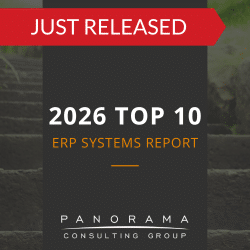Many organizations are modernizing their eCommerce processes by implementing more robust eCommerce features and integrating them with their ERP system if they are not already built-in. As a result, organizations are able to transform their ERP system into a more multi-faceted tool.
Today, we’re taking a closer look at how ERP and eCommerce are related. We’ll also share tips for selecting an eCommerce solution.
What eCommerce Functionality can be Integrated With ERP Software?
Enterprise software vendors offer a variety of applications and features that are relevant to eCommerce businesses. You can also purchase a separate eCommerce platform, but functionality will be limited unless you integrate the platform with your ERP.
Let’s review which ERP eCommerce features to prioritize:
1. CRM
A customer relationship management (CRM) platform allows eCommerce retailers visibility into every aspect of their sales cycles. This enables them to provide more targeted and personalized customer support, which can improve satisfaction levels and retention rates.
A CRM system gives eCommerce companies insights into the behaviors, preferences, and interests of their customers. It provides a 360-degree view of their buying habits, search inquiries, and more.
The top 10 ERP systems featured in our latest report include CRM functionality that is directly relevant to eCommerce retailers. Learn more by downloading our report.
The 2026 Top 10 ERP Systems Report
What vendors are you considering for your ERP implementation? This list is a helpful starting point.
2. Finance
Accurate, up-to-date financial data is key for enterprise decision-making. This is why most ERP software contains financial management and accounting tools as their core components.
Retailers need financial insights to centralize their processes and develop effective forecasting models. This helps them plan for critical reorders and anticipate delivery lead times. It also gives them access to financial data that helps them determine which vendors they should work with, or which customers still hold a balance on their accounts.
For this reason, many retailers already use some type of accounting software to help them keep up with the financial side of running their company. If this is the case, it’s smart to integrate this functionality with an ERP platform. This way, the information can be shared across departments with ease.
3. Inventory Management
As retailers continue to grapple with the realities of a post-pandemic economy, they’re finding that inventory issues are among the most prominent of their concerns. Even top names in the industry have found themselves with inventory levels that frequently exceed sales gains.
Online companies are in a particularly sticky spot, as eCommerce businesses often have higher volumes of sales and a greater number of products available. With such fast-paced operations, it’s easier to make mistakes.
This is why, from a functionality standpoint, order management and inventory management are the most important functions for an eCommerce owner. They need the ability to fulfill orders as soon as a buyer purchases an item from their website. To achieve this balance, they need full visibility into their inventory levels.
In this highly competitive space, speed wins. Companies that can quickly complete and ship orders are favored over those with process inefficiencies.
4. Shipping and Distribution
Many online companies have a business model known as drop shipping. In short, this means that the retailer first sells a product online. Then, they order that product from a third-party vendor, and the vendor is responsible for shipping the item to the buyer.
Over the past few years, this has become a popular alternative to traditional inventory management. It allows retailers to offer a larger variety of items to their customers without needing a larger warehouse.
When organizations integrate ERP and eCommerce, they can enhance this process. The ERP function provides visibility into current inventory levels and allows retailers to track their shipments to ensure prompt delivery and customer satisfaction.
How to Select an eCommerce System
If you already have an ERP system but want a dedicated eCommerce system to extend the existing eCommerce-related features of your ERP, here are a few areas to ask about when you meet with each vendor.
1. Scalability
When working with organizations during the software selection stage, our ERP consulting services focus on software scalability. This is because the solution you select should be able to grow as your business grows. This is true of eCommerce solutions, as well.
Many retailers are opting for software-as-a-service (SaaS) eCommerce solutions for this very reason. These subscription-based platforms allow you to purchase a base package when you’re just starting out, and then upgrade to more enhanced features as required.
For instance, you might decide you want to allow customers to track the shipping status of their orders. You can easily add this functionality to a scalable eCommerce solution.
With a SaaS solution, the provider houses all the hardware and infrastructure. This lowers your internal operating costs so you can focus on growing your business.
2. Accessibility and User Friendliness
Customers will access your eCommerce site from a variety of different devices. The user interface (UI) should be cohesive and user-friendly on each of them.
We recommend testing the UI yourself to see how easy it is to use. You can also access a demo version and try it on various devices to ensure all the features and functions look and operate as they should.
3. Payment Processing
Most eCommerce systems don’t process customer payments at checkout. Instead, many come out-of-the-box with payment gateways that connect your system to a major credit card company.
While most systems have this feature, it isn’t universal across the board. Ask each vendor about available payment gateways. While they might be a little higher-priced, it’s usually more expensive to build your own custom payment connector for each payment method you want to accept.
4. Multi-Channel Capability
Is eCommerce only one part of your greater retail strategy? If you also operate a brick-and-mortar store or sell through social media, you need a system that can handle it all.
Ask about the multi-channel capabilities of each system you consider, especially if you plan to integrate it with ERP functionality. The solution should allow you to look up inventory, recall orders, and edit capabilities across channels.
Learn More About How ERP and eCommerce are Related
By combining ERP and eCommerce functions, retailers can optimize their operations and achieve greater visibility into every facet of their business.
On the eCommerce side, retailers have the tools they need to sell their products, accept payments, and process orders. On the ERP side, retailers have the administrative capabilities that many eCommerce systems lack, including cross-department communication, inventory management, supply chain management, and more.
Now that you know how ERP and eCommerce are related, contact our ERP implementation consultants below to discuss your strategy and goals before you begin software selection.














